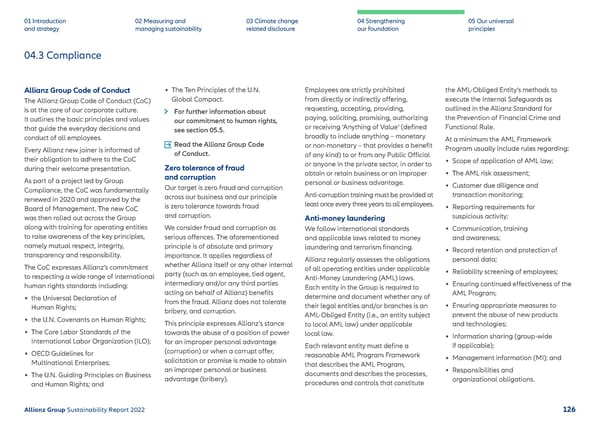01 Introduction and strategy 02 Measuring and managing sustainability 03 Climate change r elated disclosure 04 Strengthening our f oundation 05 Our universal principles Allianz Group Code of Conduct The Allianz Group Code of Conduct (CoC) is at the core of our corporate culture. It outlines the basic principles and values that guide the everyday decisions and conduct of all employees. Every Allianz new joiner is informed of their obligation to adher e to the CoC during their welcome presentation. As part of a project led by Group C ompliance, the CoC was fundamentally renewed in 2020 and approved by the Board of Management. The new CoC was then rolled out across the Group along with training for operating entities to raise awareness of the key principles, namely mutual respect, integrity, transparency and responsibility. The CoC expresses Allianz’s commitment to r especting a wide range of international human rights standards including: • the Universal Declaration of Human Rights; • the U.N. Covenants on Human Rights; • The Core Labor Standards of the International Labor Organization (ILO); • OECD Guidelines for Multinational Enterprises; • The U.N. Guiding Principles on Business and Human Rights; and • The Ten Principles of the U.N. Global Compact. For further information about our commitment to human rights, see section 05.5. Read the Allianz Group Code of Conduct. Zero tolerance of fraud and corruption Our target is zero fraud and corruption across our business and our principle is zero tolerance towards fraud and corruption. We consider fraud and corruption as serious off ences. The aforementioned principle is of absolute and primary importance. It applies regardless of whether Allianz itself or any other internal party (such as an employee, tied agent, intermediary and/or any third parties acting on behalf of Allianz) benefits from the fraud. Allianz does not tolerate bribery, and corruption. This principle expresses Allianz’s stance to wards the abuse of a position of power for an improper personal advantage (corruption) or when a corrupt offer, solicitation or promise is made to obtain an improper personal or business advantage (bribery). Employees are strictly prohibited fr om directly or indirectly offering, requesting, accepting, providing, paying, soliciting, promising, authorizing or receiving ‘Anything of Value’ (defined broadly to include anything – monetary or non-monetary – that provides a benefit of any kind) to or from any Public Official or anyone in the private sector, in order to obtain or retain business or an improper personal or business advantage. Anti-corruption training must be provided at least onc e every three years to all employees. Anti-money laundering We follow international standards and applicable laws related to money laundering and terrorism financing. Allianz regularly assesses the obligations of all op erating entities under applicable Anti-Money Laundering (AML) laws. Each entity in the Group is required to determine and document whether any of their legal entities and/or branches is an AML-Obliged Entity (i.e., an entity subject to local AML law) under applicable local law. Each relevant entity must define a r easonable AML Program Framework that describes the AML Program, documents and describes the processes, procedures and controls that constitute the AML-Obliged Entity’s methods to e xecute the Internal Safeguards as outlined in the Allianz Standard for the Prevention of Financial Crime and Functional Rule. At a minimum the AML Framework Pr ogram usually include rules regarding: • Scope of application of AML law; • The AML risk assessment; • Customer due diligence and transaction monitoring; • Reporting requirements for suspicious activity; • Communication, training and awareness; • Record retention and protection of personal data; • Reliability screening of employees; • Ensuring continued effectiveness of the AML Program; • Ensuring appropriate measures to prevent the abuse of new products and technologies; • Information sharing (group-wide if applicable); • Management information (MI); and • Responsibilities and organizational obligations. 04.3 Compliance Allianz Group Sustainability Report 2022 > 126
 Sustainability Report 2022 | Allianz Page 126 Page 128
Sustainability Report 2022 | Allianz Page 126 Page 128